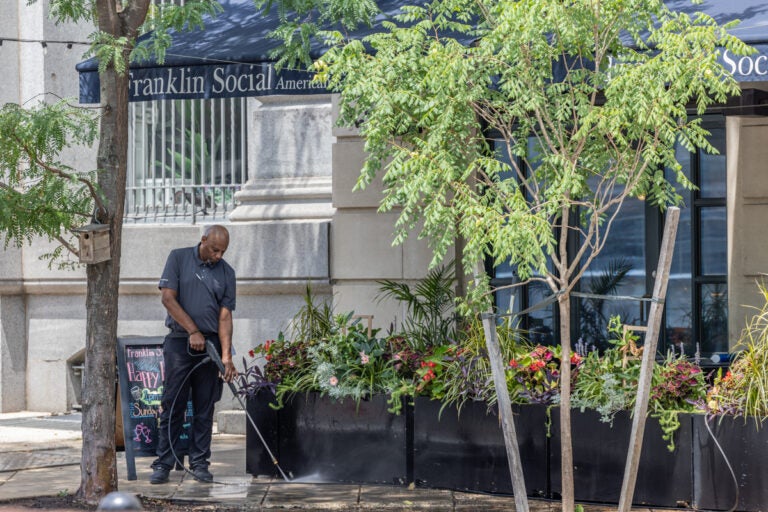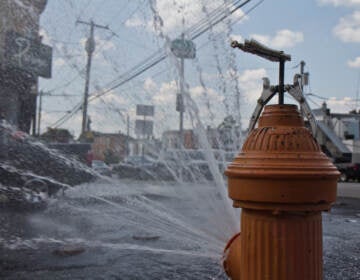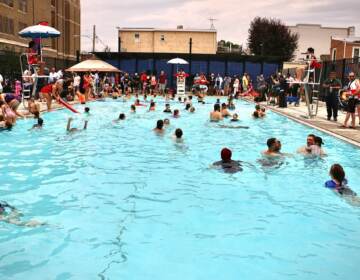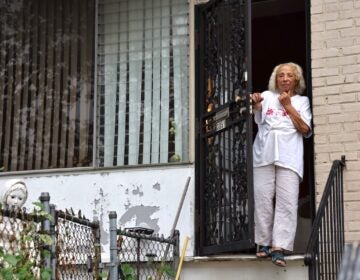Pennsylvania House bill lays out new heat protections for workers
The bill, introduced ahead of Labor Day, would require employers to provide paid rest breaks and water when the heat index hits 80 degrees Fahrenheit.

A worker power washes the sidewalk during an intense heat wave in Philadelphia on July 9, 2024. (Kimberly Paynter/WHYY)
This story is part of the WHYY News Climate Desk, bringing you news and solutions for our changing region.
From the Poconos to the Jersey Shore to the mouth of the Delaware Bay, what do you want to know about climate change? What would you like us to cover? Get in touch.
Pennsylvania law protects workers from toxic fumes, unsafe scaffolds and dangerous power tools. But not extreme heat.
A group of state lawmakers wants to change that.
A bill introduced to the Pennsylvania House of Representatives on Friday would establish worker protections on hot days across the state. It would require employers to provide paid rest breaks and water for employees when the heat index — a measure that reflects both temperature and humidity — in their work spaces hits 80 degrees Fahrenheit.
“Thousands of workers in Pennsylvania are right now subjected to long hours in extreme heat. And this isn’t just heat that’s uncomfortable or unpleasant to work in, but we’re talking about potentially fatal temperatures,” said Rep. Elizabeth Fiedler, the bill’s main sponsor. “The goal really is to make sure that every worker who goes to work in the morning is able to return home to their family at night.”
In June, Philadelphia’s Department of Public Health reported that five people died from heat exposure, during a three-day period when average round-the-clock temperatures reached 88 degrees. It’s unclear if any of the fatalities were linked to the workplace. Heat is the No. 1 weather-related cause of death for Americans, according to the Environmental Protection Agency and the National Weather Service.
Proposed heat protections could apply around 100 days per year
Globally, human-caused climate change is driving up temperatures. In the northeastern U.S., heat waves are becoming longer and hotter.
The number of days each year when Philadelphia’s heat index tops 80 degrees — the level at which the protections outlined in Fiedler’s bill would kick in — has trended up in recent decades, with the city experiencing roughly 11 more of these days in 2023 than it did in 1979, according to the research nonprofit Climate Central.
In 2023, the city saw over 100 days when the bill’s workplace protections would apply.
No federal heat standards for workers, yet
There are currently no specific federal protections for workers during extreme heat. The Occupational Safety and Health Administration argues its “general duty” clause, which requires employers to provide a workplace free from hazards likely to cause death or serious harm to employees, can apply to heat-related hazards.
Under President Joe Biden, the Occupational Safety and Health Administration proposed a new rule to protect workers from extreme heat, requiring drinking water and rest breaks above certain temperatures.
Under President Donald Trump, whose Labor Department has moved to drop or rewrite dozens of other workplace regulations, the agency has seemingly moved the proposal forward, holding public hearings earlier this summer. A spokesperson for OSHA did not respond to a question about whether the agency plans to finalize the rule.
In the meantime, several states have enacted their own heat standards. Last year, Maryland became the first state on the East Coast to finalize heat safety standards for workers. Conversely, Texas and Florida have prevented local municipalities from putting in place heat protections for workers.
“In the absence of federal guidelines in place, we really think that Pennsylvania needs to lead,” Fiedler said.
State heat protections would apply to both indoor and outdoor workers
The protections would apply to all workplaces, both indoor and outdoor, with a few exceptions. They would not apply to emergency responders, firefighters or construction workers working during emergency situations.
“[Heat] is a real risk to construction workers outside, farm workers, workers in warehouses or in kitchens or other indoor facilities,” Fiedler said. “It really crosses the whole spectrum of the kinds of conditions workers can be in during their work day.”
Across the country, more than 1 in 7 outdoor workers experienced heat exhaustion and other heat-related symptoms on the job in 2023, according to a survey from the research nonprofit Urban Institute. Health impacts from heat were most common in the agriculture, mining and construction industries, as well as among low-wage workers, Hispanic men and noncitizens.
Nationwide, dozens of workers die from heat each year.
Pennsylvania employers would need to postpone ‘non-essential’ tasks in hot conditions
Under the bill, a copy of which was provided to WHYY, employers would need to develop and follow a plan for monitoring the heat index that workers are exposed to, providing rest breaks and water and responding to any symptoms of heat-related illness in employees.
Employers would need to postpone nonessential tasks during high-heat conditions and limit the length of time an employee is exposed to high heat. The bill would also require employers to train workers about the risks of extreme heat and prevent employers from retaliating against workers if they refuse to work in dangerously hot conditions.
Fines for employers that don’t comply with the standards would range from $500 for failure to post information about heat protections to $200,000 for a repeated violation that results in the death of an employee from heat-related illness.
Fiedler’s bill would require the Pennsylvania Department of Labor and Industry to set additional protocols for workplaces when the heat index passes 90 degrees. The department would need to issue all heat regulations within 14 months of the bill being signed into law.
What’s next for the legislation
The bill introduced Friday would need to pass both the state House, where Democrats hold a narrow majority, and the Republican-controlled state Senate, before it could go into effect. Republicans and Democrats in the state legislatures have recently been locked in a fight over the state budget, which is now two months overdue.
The proposed federal heat standards faced opposition from industry groups, including one that represents oil and gas companies, which asked the Department of Labor late last year to “not proceed” on the heat standard. Business and industry groups have more recently asked the Department of Labor to weaken the rule.
Will Simons, a spokesperson for Gov. Josh Shapiro, said in a statement that Shapiro’s administration will “monitor and review” the bill as it moves through the legislature.
“The Shapiro Administration strongly believes in and supports efforts and measures to increase workplace safety and standards for workers year-round,” he wrote.

Get daily updates from WHYY News!
WHYY is your source for fact-based, in-depth journalism and information. As a nonprofit organization, we rely on financial support from readers like you. Please give today.








